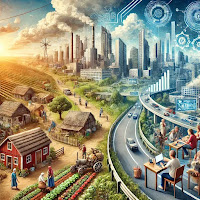EDUCATION
Education word is derived from the Latin word educare, meaning, bring forth. It may be defined as a process whereby the social heritage of a group is passed on from one generation to another, as well as the process whereby the child becomes socialized.
According to John Dewey, “Education is reconstruction or reorganization of experience which adds to the meaning of experience and which increases the ability to direct the course of subsequent experiences.”
FUNCTIONS OF EDUCATION
The five main functions of education are –
1. To complete the socialization process:
The main social objective of education is to complete the socialization process. The child in a modern family depends on the school and other institutions to complete the socialization process. The school devotes much of its time and energy to matters such as cooperation, good citizenship, doing one’s duty, and upholding the law. Directly through textbooks and indirectly through celebration of programmes patriotic sentiments are instilled.
2. To transmit the cultural heritage:
All societies maintain themselves by the exploitation of a culture. It refers to a set of beliefs and skills, art, literature, philosophy, religion, music, etc., that are not carried through the mechanism of heredity. They must be learned. Education has this function of cultural transmission in all societies.
3. For the formation of social personality:
Individuals must have personalities shaped or fashioned in ways that fit into the culture. Education has the function of the formation of social personalities and helps in transmitting culture through proper molding of social personalities. In this way, it contributes to the integration of society and adapts themselves to their environment, survives, and reproduces themselves.
4. Reformation of attitudes:
Education aims at the reformation of attitudes wrongly developed by the children already. For various reasons, the child may have absorbed various attitudes, beliefs and disbeliefs, loyalties and prejudices, jealousy and hatred, etc. These are to be reformed. Education’s function is to see that unfounded beliefs, illogical prejudices and unreasoned loyalties are removed from the child’s mind.
5. Education for occupational placements:
Education helps the adolescent for earning his livelihood. Education has become today nothing more than an instrument of livelihood. It should enable the student to eke out his livelihood. Education must prepare the student for future occupational positions. The youth should be enabled to play a productive role in society. Accordingly, great emphasis has been placed on vocational training.
6. Encourages the spirit of competition:
The school instills cooperative values through civic and patriotic exhortation or advice. Yet the school’s main emphasis is on the personal competition. For each subject studied, the child is compared with the companions by the percentage of marks or rankings. The teacher admires and praises those who do well and frowns upon those who fail to do well.
7. Education Imparts Values:
The school’s curriculum, “extra-curricular” activities and the informal relationships between students and teachers communicate social skills and values. A school’s various activities impart values such as ‘co-operation’ or team spirit, obedience, and ‘fair play.’ This is also done through curriculum, that is, through lessons in history, literature, etc.
8. Education acts as an integrative force:
Education acts as an integrative force in society by communicating values that unite different sections of society. The family may fail to provide the child the essential knowledge of the social skills and values of the wider society. The school or educational institutions can help the child learn new skills and interact with people of different social backgrounds.
Therefore, education universally is an essential ingredient for all ages and stages of the life of an individual, society as well as nation. Education can be a real panacea for all social evils.





0 Comments